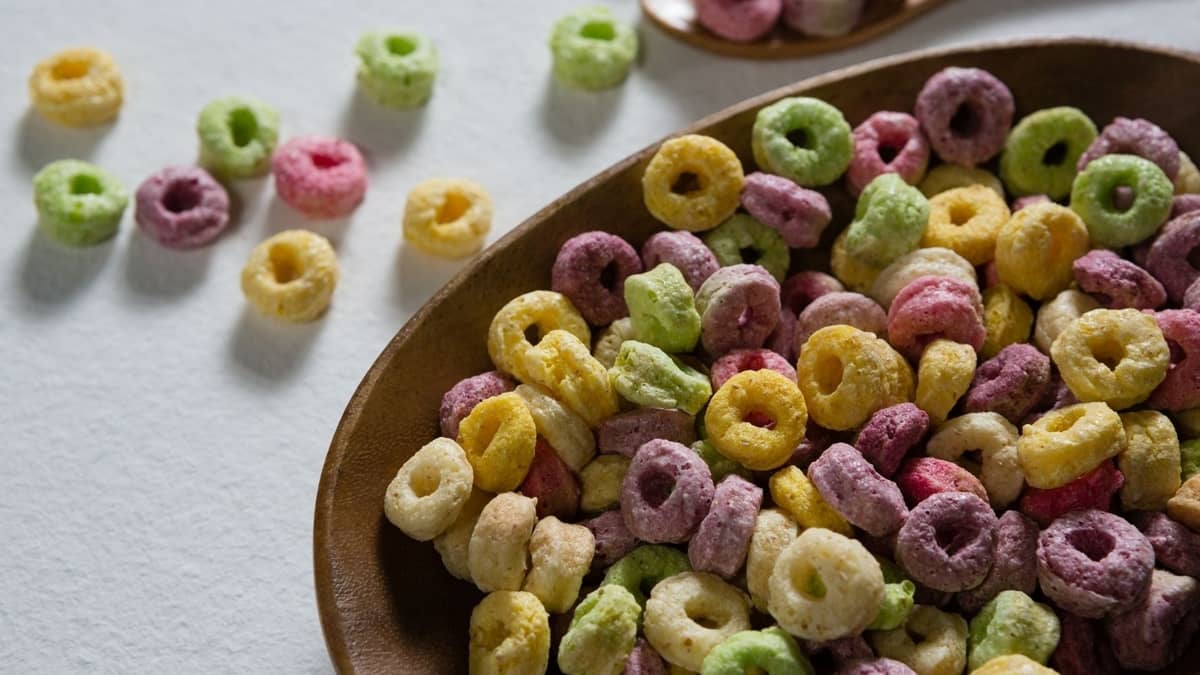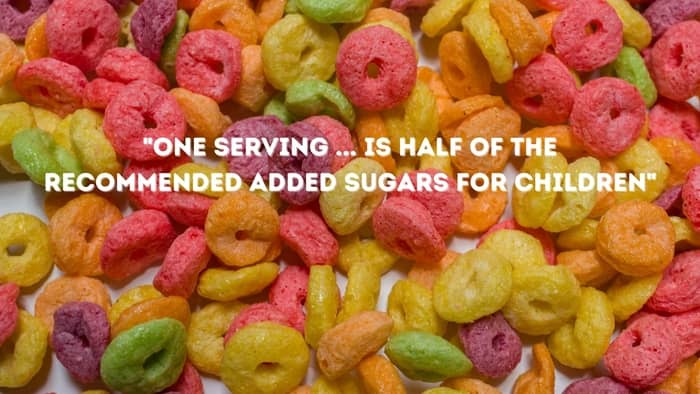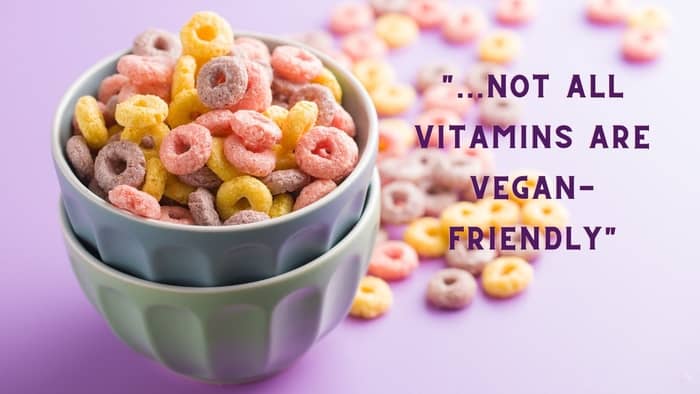Last Updated on October 1, 2021 by Guillermina
One of my favorite parts about going to the grocery store as a kid was walking down the endless cereal aisle, excited to pick a cereal to buy. As an adult following a plant-based diet, my reaction isn’t quite the same. Many of my favorite cereals as a child, like Froot Loops, are not vegan – or even healthy.
What are Froot Loops?
Eye catching in its bright red box, this rainbow-colored breakfast cereal was first created in 1963. You may also recognize Toucan Sam, the Froot Loops official mascot. This cereal has been around for a long time and is loved by both kids and adults.
Are Froot Loops Bad for You?
Breakfast cereals can get a bad rap for added sugars and low-quality ingredients. On the box, Froot Loops advertises it’s a good source of fiber and made with whole grains. Let’s take a deep dive into the nutrition facts and ingredients list to determine if Froot Loops are bad for you.
Nutrition
Known for being a flavorful breakfast cereal, Froot Loops’ nutrition is worth taking a look at. Per serving without milk, a bowl of Froot Loops is 150 calories, 34 g carbohydrates, 2 g fiber, and 12 g of added sugars. Additionally, this breakfast cereal only offers 2 g of protein.
The 2020-2025 Dietary Guidelines for Americans recommend adults limiting added sugars to no more than 10% of your total daily calorie intake, which is 50 g per day for a 2,000-calorie eating plan. For children under 18 years old, aim for less than 24 g added sugars per day. One serving of Froot Loops is half of the recommended added sugars for children – that’s a lot!
A key part of a healthy breakfast is including some protein and fiber. Adding these two components will slow the digestion of sugars and help keep you fuller for longer. Froot Loops alone has a very low amount of protein and only 2 g of fiber.
Ingredients
There are a couple things to keep in mind when reading an ingredients list on a packaged good. Ingredients listed are always in order of the largest to smallest amounts. The label must include a list of FDA-certified color additives but can group other ingredients that are similar under an umbrella term, like “spices” or “natural flavor”. More on this later.
Kellogg’s Froot Loops currently have 25 different ingredients and additives – none of which actually include real fruit. There are three types of flours included: corn blend, wheat, and whole-grain oat. Despite its whole grain advertisement on the box, only one of three whole grains are included in its ingredients. Along with vegetable oil, there are four food colorings and a preservative listed.
You may be wondering what “BHT for freshness” is on the ingredients list. BHT is a preservative used mostly in processed foods and is generally recognized as safe by the FDA. However, it does appear on the Environmental Working Group’s Dirty Dozen Food List, with some recent research indicating to steer clear of both BHT and BHA.
Non-Vegan Ingredients
The ingredients in Froot Loops up to this point may not have been nutritious, but they hadn’t broken any vegan rules. However, there are several non-vegan ingredients in Froot Loops.
Sugar
The second ingredient in the long list is sugar. Refined cane sugar does not naturally have animal products in it but is processed using bone char, an animal byproduct. Depending on your personal definition of vegan, you may be okay with non-organic sugar in your diet.
Vegan-friendly, unrefined sugars include organic cane, beet, coconut sugar, and raw sugar. Brands that sell these sugars often have a Certified Vegan Logo. Other vegan sweeteners are maple syrup and agave.
Vitamin D3
It may come as a surprise that not all vitamins are vegan-friendly. Vitamin D3, specifically sourced from lanolin, is not vegan. Coming from sheep’s wool, this animal byproduct is amongst the cheaper ways to fortify vitamin D and is widely used in processed foods.
Since it’s in such small amounts, some vegans are okay with including this in their diets. Alternatively, foods fortified with vitamin D2 is another form of the essential vitamin and always vegan-friendly.
Natural Flavors
Vague and mysterious, natural flavors are pretty much anything that is approved for use in food. These ingredients range from derivatives of fruit and herbs, to meat and everything in between. This label makes it impossible to tell based on the ingredients list alone if a product is truly vegan or not.
So why do manufacturers use natural flavors? It can summarize ingredients lists or to hide their recipe a secret from competitors. As time goes on, consumers are questioning food companies’ transparency about what exactly these ingredients contain.
Artificial Colors
These ingredients in the food industry are controversial amongst vegans. While all of the artificial colors used in Froot Loops may be made with vegan-friendly ingredients, that does not represent the ethical component to veganism. There are many dyes used in the food industry that are tested on animals.
Carmine, a red food colorant, is actually made from animals. Even though it isn’t in Froot Loops, keep an eye out for this coloring agent made from ground-up cochineal beetles in other food and beauty products.
Alternatives
I get it – nothing will ever be exactly the same as a nostalgic bowl of Froot Loops. Upgrading your childhood cereal with one of these similar vegan options is better for your health and the planet. Of note, a few of these options do include organic natural flavors but are otherwise vegan friendly.
- Nature’s Path: Envirokidz Cheetah Chomps
- The Cascadian Farms: Organic Fruitful-O’s
- High Key Protein Cereal: Fruity
- Kashi by Kids: Organic Berry Super Loops
- Three Wishes: Fruity Grain Free Cereal
Conclusion
Froot Loops are not vegan because they contain four categories of non-vegan ingredients. Looking at the Froot Loop ingredients, there are definitely healthier breakfast options out there. Skip the extra sugar and try a vegan-friendly version of Froot Loops next time you’re craving cereal!
Read more about On-The-Go Vegan-Friendly Ideas At McDonald’s


